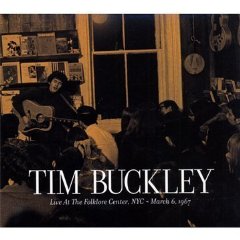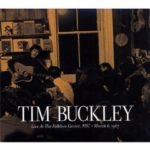
Tompkins Square
One of the last chapters of Tim Buckley, portrait of a young musician as a folk artist, comes in the release of Live at the Folklore Center, NYC: March 6, 1967. Performed shortly before he developed his psychedelic folk vision on his second album, Goodbye and Hello, and in front of an intimate crowd of 35, he leans more towards Joan Baez than jazz in his stylistic choices and tone. But even through a set of stereo speakers 42 years after the Center’s owner, Izzy Young, pressed ‘record’ on the reel-to-reel tape player, the power of the performance rings through. Still, there are glimpses of the adventurous paths Buckley will take before his untimely death in 1975. He acts as if the old traditions are being reformed into new shapes. Displaying that subtle twists will be prevalent, the opener, “Song For Jainie,” sounds like a love ballad on the surface but instead presents temptation as its core theme. Later, “No Man Can Find the War” moves from the news of the times to a depth of what it takes to initiate battles.
Throughout the 16 tracks, the muscular acoustic guitar playing evokes the rhythmic force normally found in the rock world in work by Jimmy Page or Pete Townshend. The complexity of Buckley’s style also evokes thoughts of Nick Drake with “No Man Can Find the War” predating Drake’s “River Man.” Even Indian raga elements show up during “Troubadour.” In addition to the power of the strumming, “I Never Asked To Be Your Mountain” shows that Buckley presents a discernible approach that goes beyond folk, rock and shades of jazz. It simply soars on its wings of artistic exploration, while “I Can’t See You” toys with roots traditions in ways that develop into a rock-bluegrass hybrid.
While the focus deserves to remains on the relaxed yet intense performance Buckley gives, it’s inescapable to not think of the creative connection between Tim, the father, and Jeff, the son who made a lasting impression with the album Grace shortly before he perished. It can be heard running from “Dolphins” from Folklore Center on through the offspring’s “Lover, You Should’ve Come Over,” nearly three decades later. Together, this slice of analog history makes for a haunting and celebratory discovery.
*****
John Patrick Gatta recently interviwed Keller Williams at Jambands.com.



No Comments comments associated with this post